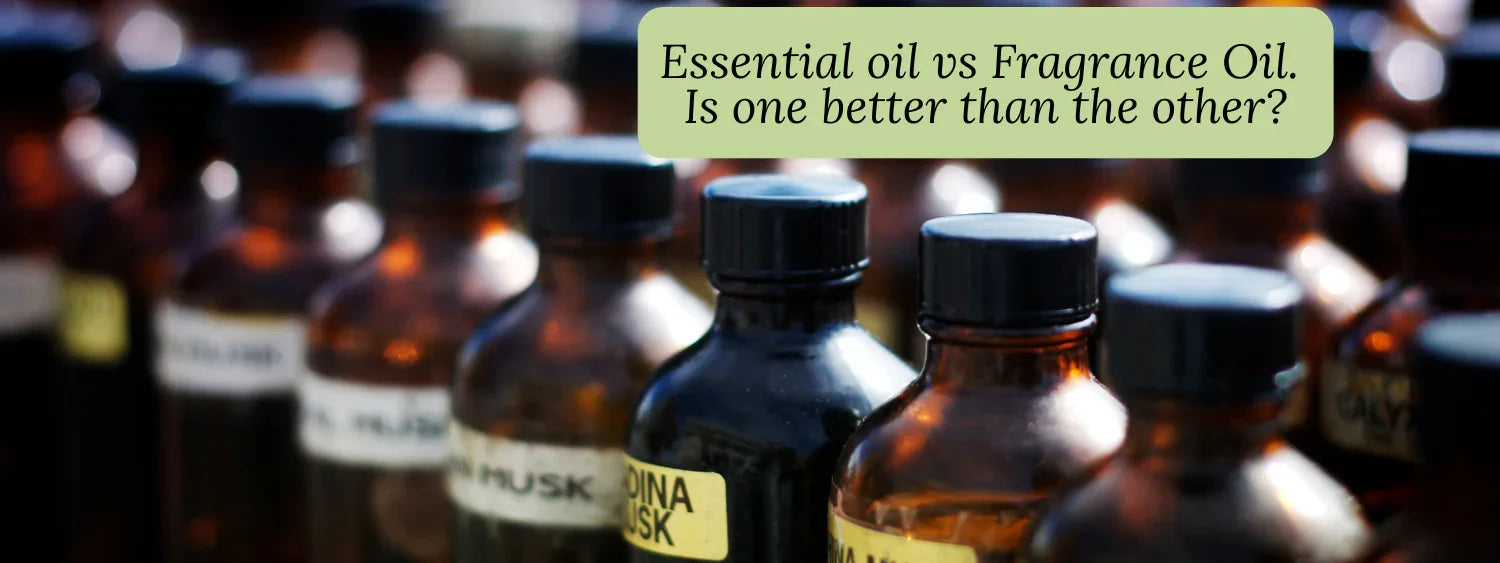
Essential vs Fragrance Oil: What is the Difference?
Essential Oils vs Fragrance Oils: What's the Difference in Soap and Cosmetic Formulation
When it comes to adding scent to your soap and cosmetic formulations, you're faced with a fundamental choice: essential oils or fragrance oils? As a formulator, understanding the differences between these two options is crucial for creating products that not only smell amazing but also meet your performance, safety, and cost requirements.
Let's dive deep into the world of scenting agents and explore which option might be best for your specific formulation needs.
What Are Essential Oils?
Essential oils are concentrated, volatile aromatic compounds extracted from plants through various methods including steam distillation, cold pressing, or solvent extraction. These oils capture the "essence" of the plant's fragrance and are considered natural ingredients.
Common extraction methods:
- Steam distillation (most common)
- Cold pressing (for citrus oils)
- CO2 extraction
- Solvent extraction
Popular essential oils in soap making include lavender, tea tree, peppermint, eucalyptus, and lemon.
What Are Fragrance Oils?
Fragrance oils are synthetic or semi-synthetic aromatic compounds specifically designed to provide scent. They're created by perfumers and chemists to achieve specific fragrance profiles that may not exist in nature or to replicate natural scents more affordably and consistently.
Types of fragrance oils:
- Synthetic fragrance oils (entirely lab-created)
- Nature-identical fragrance oils (synthetic but chemically identical to natural compounds)
- Semi-synthetic fragrance oils (blend of natural and synthetic components)
The Great Debate: Natural vs Synthetic
Essential Oils: The Natural Choice
Advantages:
- Natural origin: Derived directly from plants, appealing to consumers seeking "clean" products
- Therapeutic properties: Many essential oils offer aromatherapeutic benefits and skin-supporting properties
- Complex scent profiles: Natural oils often have nuanced, multi-layered fragrances that evolve over time
- Marketing appeal: "Essential oil" on a label often commands premium pricing
Disadvantages:
- Cost: Significantly more expensive than fragrance oils (sometimes 10-20x more)
- Inconsistency: Natural variations in plant sources can lead to batch-to-batch scent differences
- Limited scent options: Restricted to what nature provides
- Stability issues: Many essential oils are volatile and may fade quickly in soap
- Allergenic potential: Natural doesn't mean hypoallergenic; many essential oils contain known allergens
- Usage restrictions: Some essential oils have strict usage limits due to safety concerns
Fragrance Oils: The Synthetic Solution
Advantages:
- Cost-effective: Much more affordable than essential oils
- Consistency: Batch-to-batch uniformity in scent profile
- Unlimited creativity: Can create any scent imaginable, from realistic duplicates to fantasy fragrances
- Stability: Formulated to withstand the soap-making process and maintain scent longevity
- Safety testing: Undergo rigorous safety testing for cosmetic use
- Concentration: Often more potent, requiring smaller usage amounts
Disadvantages:
- Synthetic perception: Some consumers prefer "natural" ingredients
- Limited therapeutic claims: Cannot claim aromatherapeutic benefits
- Potential irritants: Some synthetic compounds may cause sensitivities
Technical Considerations for Formulation
Soap Making Specifics
pH Stability: Soap has a high pH (9-11), which can affect fragrance performance. Fragrance oils are typically formulated to withstand these conditions better than essential oils.
Acceleration: Some fragrance oils can cause soap batter to accelerate (thicken quickly), while essential oils may cause different reactions like ricing or seizing.
Discoloration: Both types can cause color changes in soap, but fragrance oils often provide more predictable results.
Special Considerations for Cosmetics
While soap making has its own set of challenges, cosmetic formulations present unique considerations when choosing between essential oils and fragrance oils. The lower pH (4.5-6.0), longer skin contact time, and diverse product formats require different approaches.
Best Practices for Cosmetic Formulations
- Always follow IFRA (International Fragrance Association)guidelines for your specific product category. Each skin area has different recommendations.
- Consider cumulative exposure - customers may use multiple scented products
- Test for compatibility with all other ingredients in your formulation
- Document everything - maintain detailed records of all fragrance ingredients
- Consider your target demographic - children's products, sensitive skin lines, etc. require different approaches
- Stay updated on regulatory changes and new safety data
- Work with qualified suppliers who understand cosmetic formulation requirements
The Dr. Soaper Hybrid Approach
At Dr. Soaper, we've found that the most successful strategy isn't choosing one over the other—it's strategically using both essential oils and fragrance oils where each performs best. This hybrid approach allows us to maximize the benefits of both while minimizing their respective drawbacks.
Dr. Soaper's "Less is More" Philosophy
In our formulations, we've learned that restraint creates superior products. One of the most common—and dangerous—mistakes in fragrance formulation is the belief that more fragrance equals better products. This couldn't be further from the truth. There are Health and Safety Risks including:
- Sensitization: Higher concentrations dramatically increase the risk of developing fragrance allergies
- Irritation: Excessive fragrance can cause immediate skin irritation, redness, and burning
- Respiratory issues: Over-fragranced products can trigger asthma, headaches, and breathing difficulties
As well as Formulation Failures:
- Soap acceleration: Too much fragrance can cause soap batter to seize or rice
- Emulsion breaking: Excessive fragrance can destabilize creams and lotions
- Color changes: High fragrance concentrations often cause unwanted discoloration
- Texture problems: Can make products greasy, sticky, or gritty
Remember, the best formulation is one that delights our customers while keeping them safe and healthy. Whether you choose a product with essential oils, fragrance oils, or a combination of both, you can be reassured that we focus on creating products that perform well, smell beautiful at appropriate levels, and bring joy to those who use them without causing harm.
The most successful products in the market today are those that understand the power of restraint—creating memorable, sophisticated fragrances that enhance rather than overwhelm the user experience. At Dr. Soaper, we've spent years perfecting this delicate art of scent, crafting each bar and bottle with the precision of a master perfumer and the care of an artisan who understands that true luxury whispers rather than shouts.
0 comments